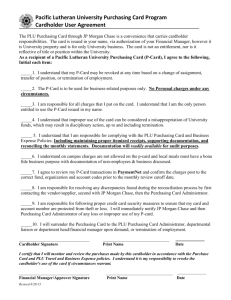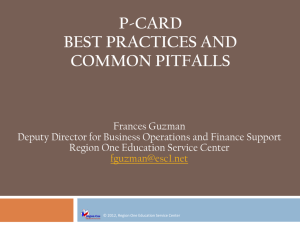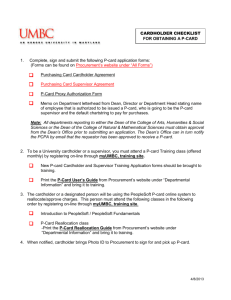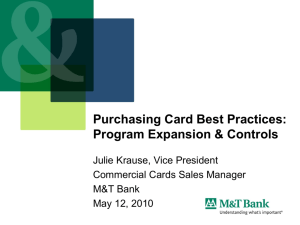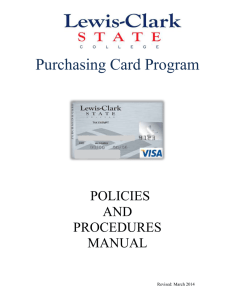What is a P-Card? - Multnomah Education Service District
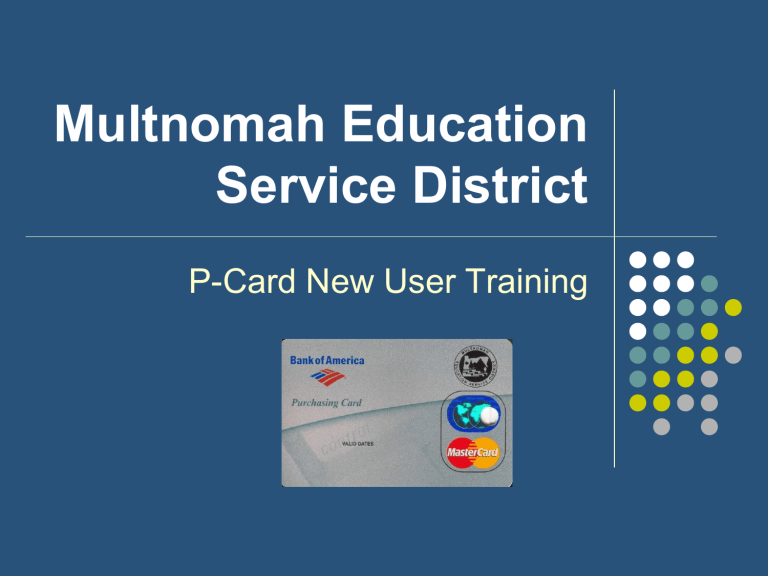
Multnomah Education
Service District
P-Card New User Training
P-Card Training Agenda
3.
4.
1.
2.
Introduction
Procurement Ethics
P-Card Purchasing Processes
P-Card Administration
Keep in mind
•
It’s about ethical purchasing practices, good recordkeeping and timely signoff in Works…
What is a P-Card?
PCard = “Procurement
Card”
A P-Card is a type of credit card with special administrative features that can be used by a business or government agency.
Why use Procurement Card?
The use of a P-Card is intended to
Promote efficiency in the procurement of goods and services
Provide a convenient method for obtaining goods and services
Why Do You Need P-Card
Training?
As a public employee, you will be responsible for upholding certain requirements:
Legal
Ethical
Procedural
Who is eligible to use
Procurement Card?
Regular employees who have successfully completed initial and periodic refresher training
Limited Temp/Seasonal employees who have successfully completed initial or periodic refresher training
Who is NOT eligible to use
Procurement Card?
Employees of temporary staffing agencies
Outside contractors/consultants
Employees on extended leave such as FMLA, Medical,
Disciplinary and other leaves of absence
Employees who have not successfully completed initial or periodic refresher training
Procurement Ethics
A Paradigm Shift
YOU are now the government purchasing agent.
YOU become the focal point for justifying your actions.
YOU become the object of any media or legal attention as to any of your actions (along with
MESD)
The GSPC
Oregon’s Government Standards & Practices
Commission
The “Ethics Commission”
Per Oregon State Law (ORS 244), the GSPC has jurisdiction over:
Use of public office for financial gain
Conflict of interest
GSPC & Public Officials
Definition of “Public Official”
ORS 244.020(15) defines a public official as “any person who… is serving the State of Oregon or any of its political subdivisions or any other public body of the state as an officer, employee, agent or otherwise, and irrespective of whether the person is compensated for such services.”
As an employee of MESD, you are a Public
Official!
The Law & You
ORS 244.040(1)(a):
" No public official shall use or attempt to use official position or office to obtain financial gain or avoidance of financial detriment that would not otherwise be available but for the public official’s holding of the official position or office...“
Examples of Financial Gain or
Avoidance of Financial Detriment
Frequent flyer miles
Free gift with purchase – classroom?
Free admissions – Due to your “position”
Waived fees – Due to your “position”
Store Credit
Safeway 10 ¢ per gallon
All goods/services/benefits associated/received with P-
Card purchase belong to
MESD.
ORS 244.020: Conflict of Interest
Before taking an official action, a public official should first: determine if an action could result in financial benefit or avoidance of financial detriment to the official, a relative or a business with which the official or a relative is associated . If the answer is "no," proceed with the action.
A “ relative " includes the public official’s spouse and the parents, children, brothers and sisters of either the public official or the official’s spouse. A " member of a household " is any relative, as defined above, who resides with the public official.
More Law & You
Any person who was a public official at the time of an alleged violation will be subject to the authority of the GSPC, for a period of four years after the alleged violation, regardless of whether or not the person is still a public official at the time a complaint is filed.
GSPC on the Web
http://www.gspc.state.or.us/
Anybody Can Report You
Downloadable complaint form on GSPC website
All Reported Cases Listed on
Web
Even if a case is dismissed, the record is kept on the GSPC website for years.
P-Card Purchasing
Process
At Multnomah ESD
P-Card Limits (Types)
Card Limits
Per-transaction limit
Per- statement cycle limit (28 th through 27 th )
Department Limits (Budget)
You need appropriate department approval
Ethical Limits
Be sure your purchase is above reproach and doesn’t present the appearance of impropriety
Things You Must Do
BEFORE Buying
If you are going to use a trade service contractor to glue, nail, screw, drill, use concrete or make a building repair at an MESD or non-MESD site, you must contact FACILITIES SERVICES:
Mark Wheeler: x 1786
If you are purchasing technology-related items that will work with the network, or for which you expect support from TS, you must contact TECHNOLOGY
SERVICES:
Wendy Chase: x 1775
Split Requirements
When a purchase contract is broken up into smaller transactions to circumvent bid/quote limits
ORS 279B.065 (2) makes split requirements illegal
Purchasing Less than
$10,000?
Quotes not mandatory
(but, would you get quotes at home?)
Avoid split requirements
If you have a stake in the vendor’s business, or if you have a close personal, professional or family connection to the vendor, ask someone else to buy.
More than $10,000
If your purchase is $10,000 or more
Follow the 3 quote process
Contact Brian Altman in Purchasing for assistance.
P-Card Administration
Your responsibilities
When to use the card ?
To the maximum extent possible.
Purchases can be made
In person
By phone
By fax
The internet
You and Your Department’s
Responsibilities
Physical Security of Cards
Keep all receipts, invoices, packing slips and quotation documents
Verify, enter description and account number in all transactions made against your card in the WORKS system
Provide all documentation for review during audits
Bank of America WORKS
A secure, web-based expense management system
Allows you to perform administrative tasks online
Provides automated reporting tools
Cardholder Responsibilities in WORKS
Each time you use your P-Card, you will receive an email saying, “Task to Perform”
Update P-Card transaction information and sign-off in the WORKS system
Enter valid account codes for your transactions unless otherwise directed
If you are a an “Approver” in
WORKS
After a P-Card User has completed transaction signoff, the “approver” will receive an email notifying that there is a transaction awaiting approval in WORKS.
Business Services’
Responsibilities
Be available for assistance when needed
Review P-Card activity for proper usage
Provide opportunities for initial and refresher training
Conduct monthly internal audits
Internal Audit
Business Services will conduct random monthly audits to monitor compliance with agency policy on purchasing, card usage, recordkeeping, and ethics. For example, we will check that:
•Purchases are made for business purposes only
•P-Card receipts are retained
•Quote documentation maintained (purchases of
$10,000 or more)
•No “Split Purchases” have occurred
•Cards have been cancelled when appropriate
•Timeliness of task completion in WORKS
Audit Results
Most Common Mistakes. . .
No description
Description too vague: “parking”
Delay in Cardholder/Manager Sign Off
Gratuity over the 15% limit
Questionable receipts
Qualifying Receipts
Acceptable receipts
Invoice
Register Receipt
Web Page Print Out
An acceptable receipt must include
Vendor Name
Transaction Amount
Date
Itemized description of item(s) purchased
Lost Receipts
You must fill out the “Lost, Stolen or Missing
Receipt” form and submit it to your Director for approval .
Contact Brian Altman at ext. 1794 if you need the form
Records Retention
All receipts, invoices, and bank statements are to be kept as follows:
• Expenditures of federal funds:
5 years after final or annual expenditure report accepted.
• Other records:
3 years
Unapproved Uses
Personal Purchases
Cash or cash-type transaction
Frequent Flyer Programs
Purchase of items expressly prohibited by policy
eScrip Fundraising Program
( http://www.escrip.com/ )
Special Situation Uses
Percentage Off Programs
Gift Cards -student incentives (tracking mandatory)
Incentive Card Programs - Use 503-255-1841 for purchase discounts (no personal phone numbers)
Safeway card
Albertsons
Potential Problems
Suppliers that do not accept credit cards
Available Balance on Card
Returns
Disputed Charges
P-Card Contact
P-Card/WORKS and Purchasing Questions:
Brian Altman
(503) 257-1794 baltman@mesd.k12.or.us
Thank you! I will register your information with B of A and order your card.
